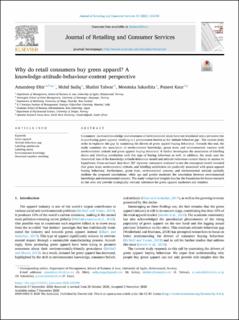Why do retail consumers buy green apparel? A knowledge-attitude-behaviour-context perspective
Journal article, Peer reviewed
Published version

Åpne
Permanent lenke
https://hdl.handle.net/11250/2767053Utgivelsesdato
2021Metadata
Vis full innførselSamlinger
Originalversjon
Journal of Retailing and Consumer Services. 2021, 59, 102398. 10.1016/j.jretconser.2020.102398Sammendrag
Consumers' increased knowledge and awareness of environmental issues have not translated into a pervasive rise in purchasing green apparel, resulting in a phenomenon known as the ‘attitude-behaviour gap’. The current study seeks to explicate this gap by examining the drivers of green apparel buying behaviour. Towards this end, the study examines the association of environmental knowledge, green trust, and environmental concern with environmental attitude and green apparel buying behaviour. It further investigates the association of labelling desire and labelling satisfaction with this type of buying behaviour as well. In addition, the study uses the theoretical lens of the knowledge-attitude-behaviour model and attitude-behaviour-context theory to anchor its hypotheses. Cross-sectional data from 387 Japanese consumers analysed to test the conceptual model revealed that green trust, environmental attitude, and labelling satisfaction are positively associated with green apparel buying behaviour. Furthermore, green trust, environmental concern, and environmental attitude partially mediate the proposed associations, while age and gender moderate the association between environmental knowledge and environmental concern. The study's empirical insights thus lay the foundation for future research in this area and provide strategically relevant inferences for green apparel marketers and retailers.
